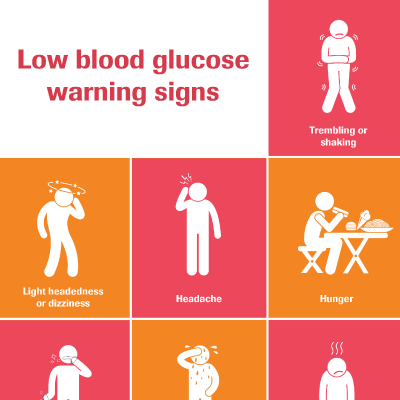Practice #GlucoVigilance during these times to be in range
Background: The current times are beyond anything we have ever experienced. During these unprecedented times, we all should put our health on priority and exercise caution. Even more so, if one has diabetes. People with uncontrolled diabetes are at a higher risk, due to lower immune response.1,2 WHO has raised an advisory and has suggested that patients with chronic ailments like cardiovascular diseases, diabetes, hypertension, chronic respiratory diseases and cancer are more prone to severe illnesses as compared to others during these times.3 Hence, it is extremely important for...
Read MoreTreating Low BG
Low blood glucose: Know the signs and steps to take You may recognize the feeling—feeling hungry, dizzy, sweaty or just a little bit "off." These signs of hypoglycaemia, or low blood glucose, mean it's time to take action. What causes low blood glucose? For most people, low blood glucose refers to anything below 4.0 mmol/L , although your number may be different.1 Low blood glucose can be caused by taking too much medication, not having enough to eat or exercising. In fact, hypoglycaemia can occur up to 12 hours after you've been...
Read MoreDiabetes Basics
Diabetes Basics Understanding the basics of diabetes is the first step in gaining control of your health. Let’s look at what causes diabetes, some of the common symptoms, the benefits of healthy living, and what to do if you’ve just been diagnosed. What is diabetes? Diabetes is a chronic disease. Your blood sugar levels are controlled by insulin, a hormone produced by your pancreas. When you eat, food gets broken down and glucose enters your bloodstream. Insulin takes the glucose out of your bloodstream and allows it to enter your cells where it is broken down and turned into energy. If you...
Read MoreHypoglycemia
Hypoglycemia occurs when your blood glucose drops too low. The body responds to low blood glucose with warning signs that may be different in each person. Some warning signs of low blood glucose are feeling: Weak Shaky Sweaty Irritable or confused Hungry Low blood glucose may occur if your meal or snack is delayed or...
Read MoreHyperglycemia
Hyperglycemia, or high blood glucose, occurs when blood glucose rises above your recommended range. Your healthcare professional will determine the proper healthy blood glucose range for you. High blood glucose can be caused by many things, including: Eating too much food Little or no physical activity Not taking medications Stress, infection or illness...
Read MoreTips for Making Testing Easier
Whether you check your blood glucose level once a week, once a day, or 6 times a day, learning how to make testing easy and less painful may inspire you to test more often. For people with diabetes, the knowledge that you gain from testing is the key to staying in control of your health. It helps you make informed decisions about medicine, food, and exercise. It helps you cope with the day-to-day demands of living with diabetes, you’ll feel better each day, and you’ll lower your risk for future diabetes complications.1 Here are some tips for getting the best results possible. A guide...
Read MoreStay healthy during COVID-19
Learn more about the safety measures by International Diabetes Federation (IDF) and World Health Organisation (WHO) against COVID-19 for people living with diabetes.
Read MoreTreating Low BG
Low blood glucose: Know the signs and steps to take You may recognize the feeling—feeling hungry, dizzy, sweaty or just a little bit "off." These signs of hypoglycaemia, or low blood glucose, mean it's time to take action. What causes low blood glucose? For most people, low blood glucose refers to anything below 4.0 mmol/L , although your number may be different.1 Low blood glucose can be caused by taking too much medication, not having enough to eat or exercising. In fact, hypoglycaemia can occur up to 12 hours after you've been...
Read MoreDiabetes Basics
Diabetes Basics Understanding the basics of diabetes is the first step in gaining control of your health. Let’s look at what causes diabetes, some of the common symptoms, the benefits of healthy living, and what to do if you’ve just been diagnosed. What is diabetes? Diabetes is a chronic disease. Your blood sugar levels are controlled by insulin, a hormone produced by your pancreas. When you eat, food gets broken down and glucose enters your bloodstream. Insulin takes the glucose out of your bloodstream and allows it to enter your cells where it is broken down and turned into energy. If you...
Read MoreHypoglycemia
Hypoglycemia occurs when your blood glucose drops too low. The body responds to low blood glucose with warning signs that may be different in each person. Some warning signs of low blood glucose are feeling: Weak Shaky Sweaty Irritable or confused Hungry Low blood glucose may occur if your meal or snack is delayed or...
Read MoreHyperglycemia
Hyperglycemia, or high blood glucose, occurs when blood glucose rises above your recommended range. Your healthcare professional will determine the proper healthy blood glucose range for you. High blood glucose can be caused by many things, including: Eating too much food Little or no physical activity Not taking medications Stress, infection or illness...
Read MoreTips for Making Testing Easier
Whether you check your blood glucose level once a week, once a day, or 6 times a day, learning how to make testing easy and less painful may inspire you to test more often. For people with diabetes, the knowledge that you gain from testing is the key to staying in control of your health. It helps you make informed decisions about medicine, food, and exercise. It helps you cope with the day-to-day demands of living with diabetes, you’ll feel better each day, and you’ll lower your risk for future diabetes complications.1 Here are some tips for getting the best results possible. A guide...
Read MoreStay healthy during COVID-19
Learn more about the safety measures by International Diabetes Federation (IDF) and World Health Organisation (WHO) against COVID-19 for people living with diabetes.
Read More







